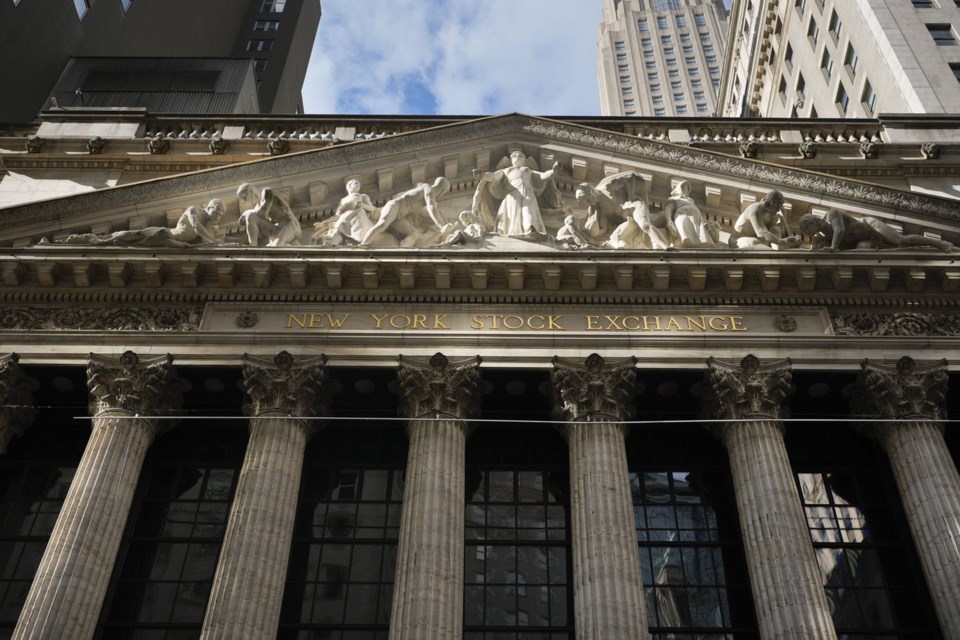NEW YORK (AP) — The “Sell America” sentiment is hitting Wall Street again and U.S. stocks, U.S. bonds and the value of the U.S. dollar are all falling after the latest reminder that the U.S government seems to be hurtling toward an unsustainable mountain of debt. The S&P 500 was 1% lower in early trading Monday after Moody’s Ratings became the last of the three major credit-rating agencies to say the U.S. federal government no longer deserves a top-tier “Aaa” rating. The Dow Jones Industrial Average was down 282 points, or 0.7%, and the Nasdaq composite was 1.2% lower.
THIS IS A BREAKING NEWS UPDATE. AP’s earlier story follows below.
Global markets, U.S. futures and the dollar all retreated early Monday after Moody’s Ratings downgraded the sovereign credit rating for the United States because of its failure to stem a rising tide of debt.
Futures for the S&P 500 lost 1.1%, while futures for the Dow Jones Industrial Average fell 0.6%. Nasdaq futures tumbled 1.5%.
Moody's forecast that federal deficits will widen to almost 9% of the U.S. economy by 2035, up from 6.4% in 2024, driven mostly by higher interest payments on debt, growing entitlement spending and low revenue generation from taxes.
Moody's said that extending President Donald Trump’s 2017 tax cuts, a priority of the Republican-controlled Congress, would add $4 trillion over the next decade to the federal primary deficit.
Late Sunday, House Republicans pushed a big package of tax breaks and spending cuts through the Budget Committee in a rare weekend vote. Still, conservative holdouts are demanding quicker cuts to Medicaid and green energy programs before giving their full support, so more changes are possible.
Uncertainty tends to make markets uneasy, and that anxiety pushed the U.S. dollar down to 144.96 Japanese yen from 145.65 yen. The yield on the 10-year U.S. Treasury was at about 4.55%, up from 4.44% late Friday as investors sought places safer than equities to park their cash.
In corporate news, Capital One closed its acquisition of Discover, the companies announced Sunday. That deal was announced more than a year ago. Capital One shares dipped a little more than 1% in premarket.
In another big week for retailers, Target, Home Depot, Lowe's and TJX Cos. all report their latest financial results. Investors will be looking closely at the companies' forecasts and whether or not they intend to raise prices like Walmart announced it likely would last week.
In reporting its latest quarterly earnings on Thursday, Walmart said it's doing everything it can to absorb the higher costs from Trump's tariffs but that higher prices were inevitable.
Trump's tariff rollouts — frequently followed by announcements of temporary pullbacks or pauses — have roiled markets in recent months and kept investors on edge. The uncertainty has been hitting U.S. households and businesses, raising worries that they may freeze their spending and long-term plans.
Markets posted solid gains last week after the U.S. and China announced a 90-day stand-down in most of their punishing tariffs against each other.
In other potential market-moving news, JPMorgan, the largest U.S. bank by assets, holds its investors conference on Monday. Analysts will be watching for any comments by outspoken CEO Jamie Dimon, who frequently offers up his opinion on global calamities, the state of the world and what direction he thinks the U.S. and global economies are headed. JPMorgan shares were down less than 1% before the bell Monday.
At midday in Europe, Germany’s DAX retreated 0.1%, while the CAC 40 in Paris lost 0.8%. Britain's FTSE 100 declined 0.4%.
Chinese markets fell after the government said retail sales rose 5.1% in April from a year earlier, less than expected. Growth in industrial output slowed to 6.1% year-on-year from 7.7% in March.
That could mean rising inventories if production outpaces demand even more than it already does. But it also may reflect some of the shipping boom before some of U.S. President Donald Trump's tariffs on Chinese goods took effect.
“After an improvement in March, China’s economy looks to have slowed again last month, with firms and households turning more cautious due to the trade war,” Julian Evans-Pritchard of Capital Economics said in a report.
Hong Kong's Hang Seng lost 0.1% to 23,332.72 and the Shanghai Composite Index was nearly unchanged at 3,367.58.
E-commerce giant Alibaba's shares in Hong Kong skidded 3.4% following a report that U.S. officials are scrutinizing a potential Apple-Alibaba deal to integrate AI features into iPhones in China.
Tokyo's Nikkei 225 gave up 0.7% to 37,498.63 while the Kospi in Seoul dropped 0.9% to 2,603.43.
Australia's S&P/ASX 200 declined 0.6% to 8,295.10.
Taiwan's Taiex was 1.5% lower.
In oil trading early Monday, U.S. benchmark crude oil lost 58 cents to $61.39 per barrel. Brent crude, the international standard, also gave up 58 cents to $64.83 per barrel.
Jiang Junzhe And Matt Ott, The Associated Press



